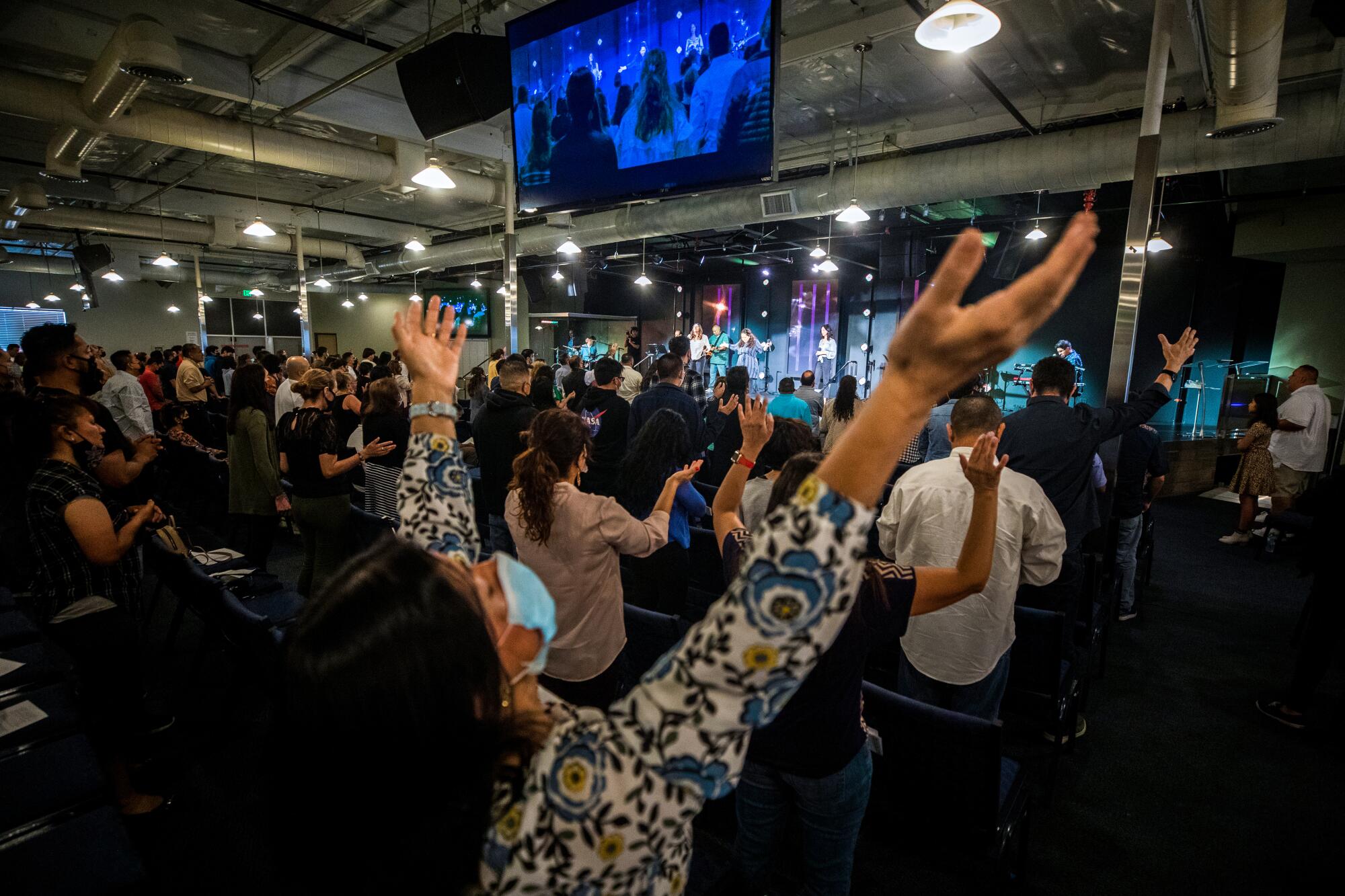
- Share via
It was only a few days before the 2020 presidential election when a woman named Martha called into Pastor Netz Gómez’s Spanish-language evangelical Christian radio show to say she was confused about who to vote for.
Gómez, the head pastor at Houses of Light Church in Northridge, immediately perked up. This was a chance for him to gently nudge another member of the faithful toward the biblical and conservative values that he embraces. So he directed Martha and other listeners to a 2020 Spanish-language voter guide that Houses of Light church leaders had created for their congregation.
“Us Christians who vote biblically can make a great difference in our nation,” said Gómez, a 61-year-old pastor from Mexico City who leads the 2,000-strong nondenominational church, which leans evangelical.
Gómez and his partner on the show, Walter Rivas, a church leader, also referred listeners to conservative websites.
“This is part of the awakening that we are having as a church,” Rivas told listeners of Good News for the Family (Buenas Nuevas para la Familia). “Don’t be afraid to participate. It’s something we have to do as citizens of this country. We have to align ourselves, as our pastor said, with God’s plan.”
Ever since Ronald Reagan gained the White House in 1980, much attention has focused on conservative white evangelical Protestants’ growing political clout. But there’s been far less attention paid to Latino evangelicals. Even as the number of U.S. white evangelical Protestants has declined since 2006, Latinos are increasingly abandoning their traditional affiliation with the Roman Catholic church and converting to evangelical Christianity.
Catholics no longer constitute a majority of the U.S. Latino population. In Pew Research Center RDD (random-digit-dial) surveys conducted in 2018 and 2019, 47% of Latinos described themselves as Catholic, down from 57% a decade ago. Meanwhile, the share of Latinos who identify as born-again/evangelical Protestants is 16%, and the share of Latinos who say they are religiously unaffiliated is now 23%, up from 15% in 2009.
Many Latinos are becoming politicized through evangelical churches led by pastors who insist they aren’t beholden to any party, but typically espouse conservative stances on core issues such as abortion, religious liberty and same-sex marriage, and are stepping up their activism ahead of national elections in 2022 and 2024. The Houses of Lights’ 2020 online voter guide gave former President Trump a four-star rating of “Very good,” while then-Presidential candidate Joe Biden garnered zero stars and a “Terrible. Don’t vote” rating.
“Our motto in 2022 is, ‘Don’t just pray,’” said Samuel Rodriguez, president of the National Hispanic Christian Leadership Conference, a Hispanic Christian organization with more than 40,000 member churches. “Register all the people in your church to vote life, religious liberty and biblical justice.”
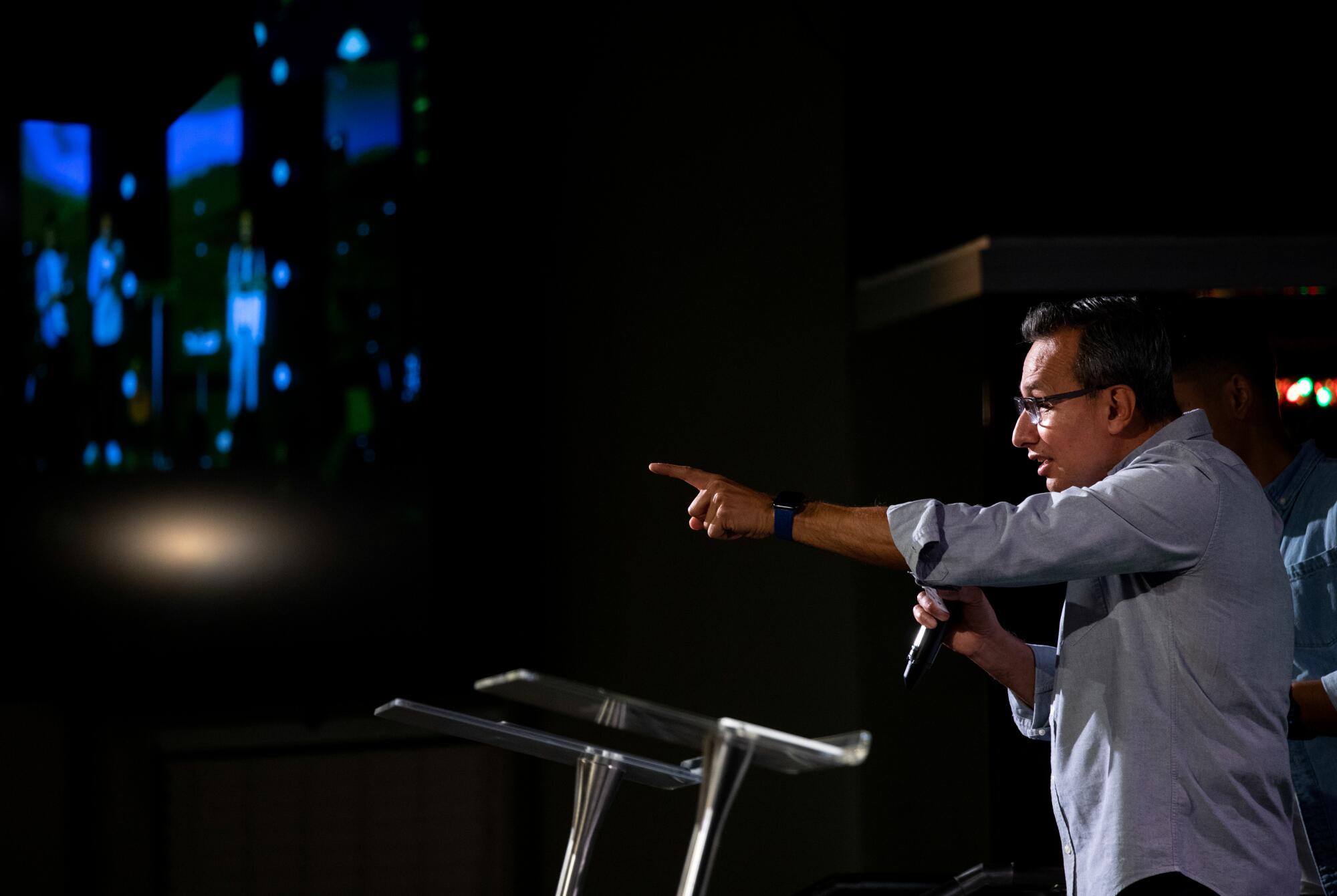
For a long time, Latino evangelicals shunned politics, Rodriguez said. “We grew up hearing from our pastors in previous generations that politics was of the devil, politics was corrupt.”
That shifted between 1980 and 2004, as Latino evangelicals gravitated toward conservative Republican candidates, while other Latinos who previously had voted Democratic drifted from the party over abortion and the Obama administration’s mass deportations of immigrants who were in the country without legal status.
Rodriguez believes that the Democratic Party has turned its back on Latino evangelicals.
“It’s not that I embrace the values of the Republican Party,” he said. “It’s that the Republican Party embraces more of my values, while the Democratic Party is not only against my values but vehemently opposed to who I am as an evangelical.”
“We’re creating our own path,” added Rodriguez, who in 2017 made headlines when he was invited to pray at Trump’s inauguration ceremony. That path, he said, includes not only working in tandem with their white evangelical counterparts, but forging their own alliances that “reconcile the message of Rev. Billy Graham with the march of Dr. Martin Luther King Jr.”
Pastor Gómez, who immigrated to the U.S. to take a job as an art director, stresses that he doesn’t tell his flock how to vote, but does encourage them to do so, even holding voter registration drives on church grounds.
He first became engaged in politics about 13 years ago, meeting and learning from some of the most influential leaders in conservative Christian circles: Craig Huey; Tony Perkins, president of the conservative Family Research Council; and Jim Domen, founder of Church United in Newport Beach.
Domen’s group encourages pastors throughout the state to become politically engaged, locally and nationally, sending pastors to Washington, D.C., and Sacramento to meet with political leaders. Gómez attended one of those field trips to Washington and is now considered a “pastor of regional influence” for Church United.
Much of Domen’s efforts are concentrated on Latino leaders. About half of the 2,000 pastors involved with Church United are Spanish-speaking, he said.
“We want to bring them to the table,” Domen said.
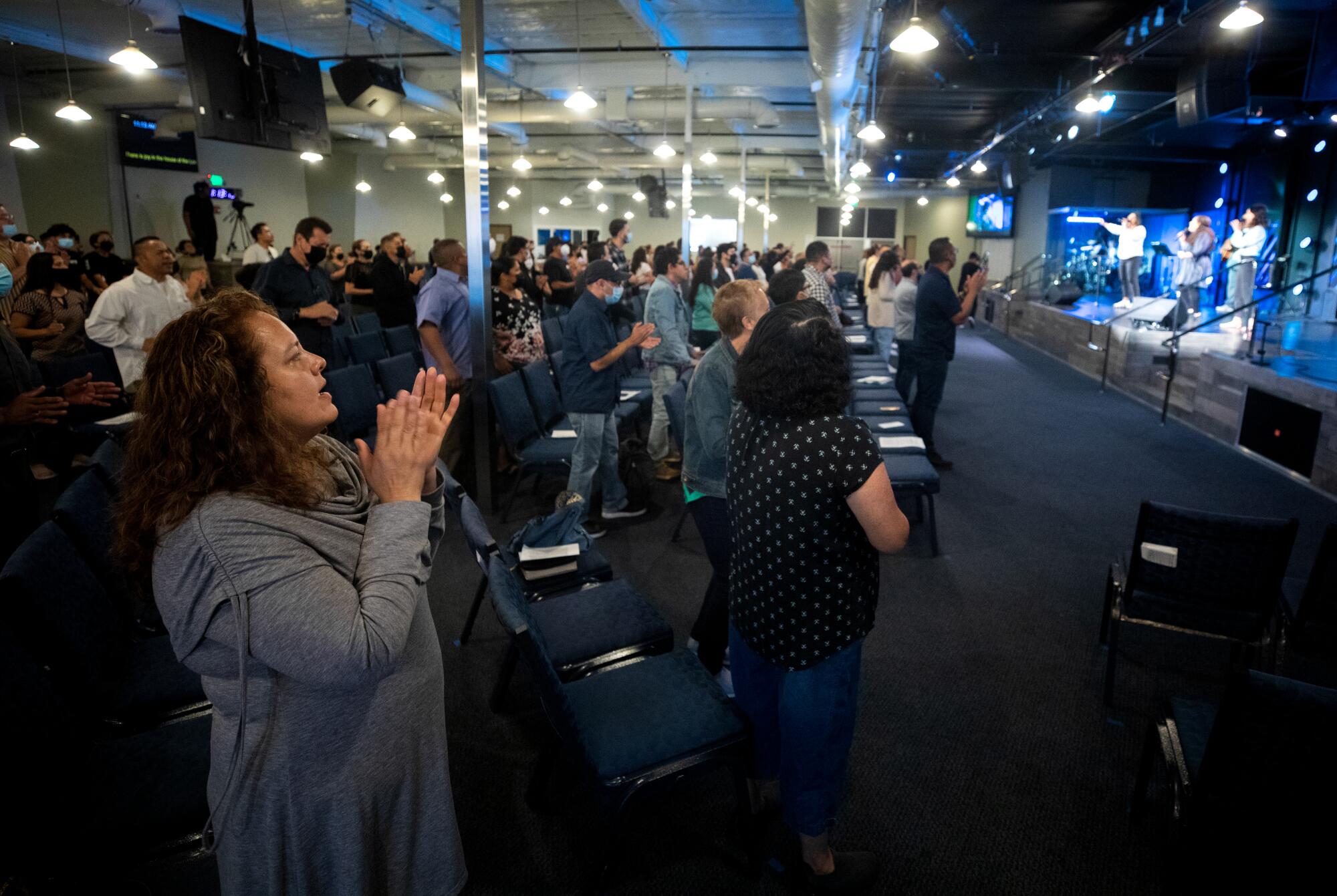
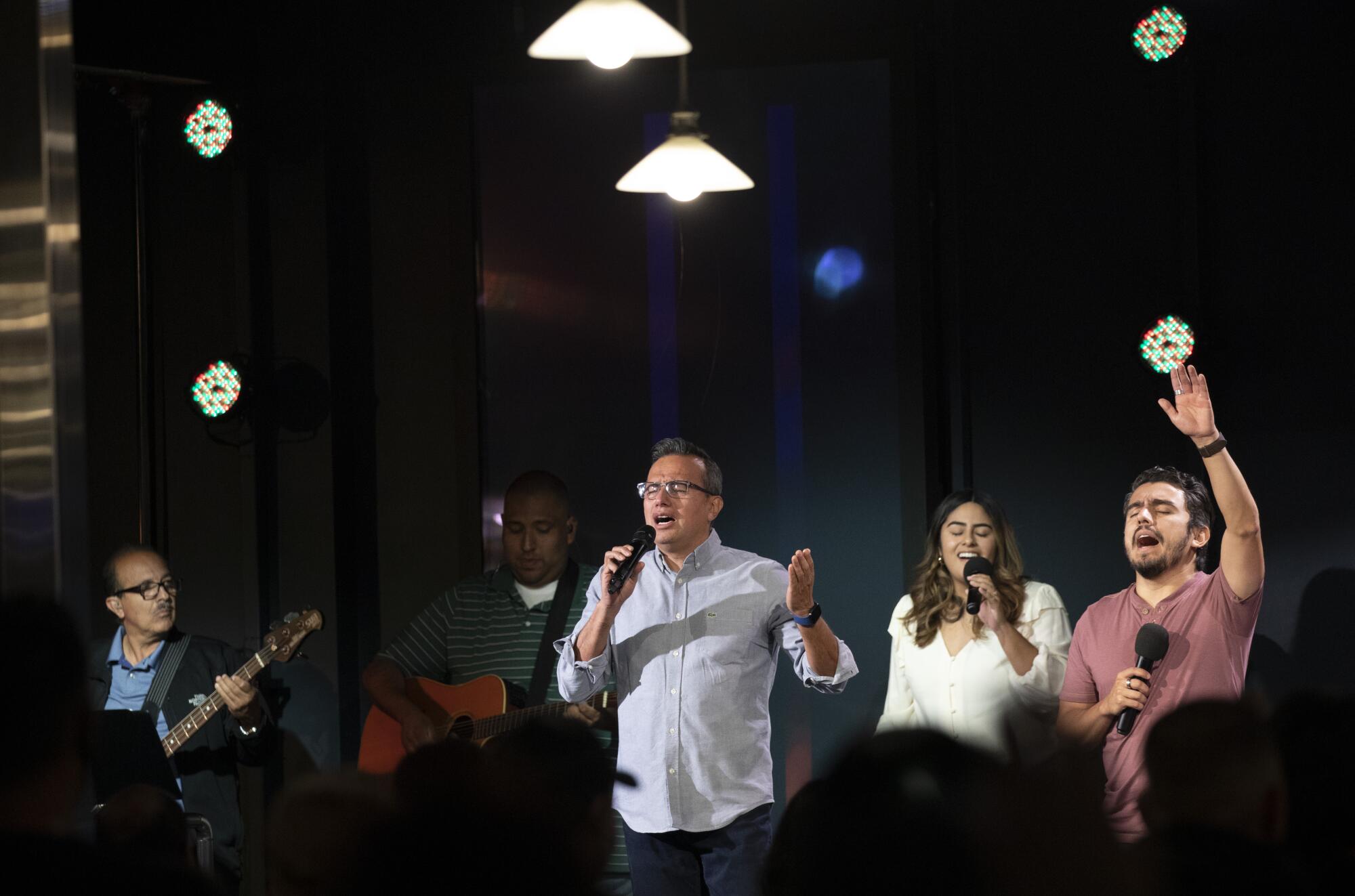
Tucked into an industrial area a few blocks away from Northridge Fashion Center, Houses of Light Church is more a block-length community center than merely a church. And Gómez, sporting jeans, a well-fitted polo shirt and a Tumi backpack one weekday last year, resembled a hip techie more than an evangelical pastor.
“We definitely need more room,” said Gómez, who 22 years ago started his church in his living room and has watched it steadily expand. “More people keep coming.”
The church provides three weekly worships and a menu of support services, including parenting classes, marriage counseling, friendship groups, bible studies, a full-time youth ministry and a Sunday school staffed by 85 teachers before the pandemic. There’s also a book shop, studio, prayer room and a food bank that feeds hundreds of people every Saturday.
Nearly half of Latinos who converted from Catholicism to evangelicalism said that an important factor was finding a church that “reaches out and helps its members more,” according to a 2104 Pew Research Center study.
Such services are especially attractive to freshly arrived Latino immigrants navigating a new country.
“They provide a sense of community hope and purpose and meaning that resonates with their Latin American values,” said Gastón Espinosa, a professor of religious studies at Claremont McKenna College. “These churches also provide a moral framework that helps them interpret the world and American society. These churches are welcoming, and they also help preserve their cultures because they are pastored by Latino pastors for Spanish-speaking people.”
The growing number of U.S. Latino evangelicals is closely tied to immigration from Latin American countries where evangelicalism has gained a foothold in recent decades. Latino evangelicals are more likely than Catholic or unaffiliated Latinos to be foreign-born, says Mark Hugo Lopez, director of race and ethnicity research at Pew Research Center. Pentecostalism and related “charismatic” religious movements — such as evangelicalism — have been burgeoning in Latin America for at least the past century.
“When we talk about Latino evangelicals, we are talking about people from Central American countries, and less so Mexican, and also some Caribbean countries,” Lopez said.
Irma Buch, a 34-year-old Guatemalan immigrant who lives in Van Nuys, said that her parents were Catholic and raised her as such. She converted to evangelicalism after her clandestine journey to the United States more than 14 years ago.
“I felt God’s hand on my way here,” she said. “Once I arrived, I felt I needed more of a connection to God.”
A mother of three who attends Houses of Light church, Buch doesn’t have U.S. legal status and can’t vote. But if she could, she would have voted for Trump because of his anti-abortion stance.
“It’s true that he deported many people,” she said. “But at the same time, we see that he does things that please God.”
Trump’s tough-guy, rule-breaking persona also appeals to a certain strain of evangelicals, particularly Pentecostals, according to Erica Ramirez, a sociologist of religion and director of applied research at Auburn Seminary in New York City.
“The snark and anti-institutionalism of President Trump reveals instead the persistence of anti-elitist affinities in a group of people who have demonstrated, over hundreds of years, an appetite for disrupting genteel politics,” Ramirez wrote in a theological publication published in July.
“Disrespectful mockery is an enduring trait of U.S. evangelicalism,” she wrote.
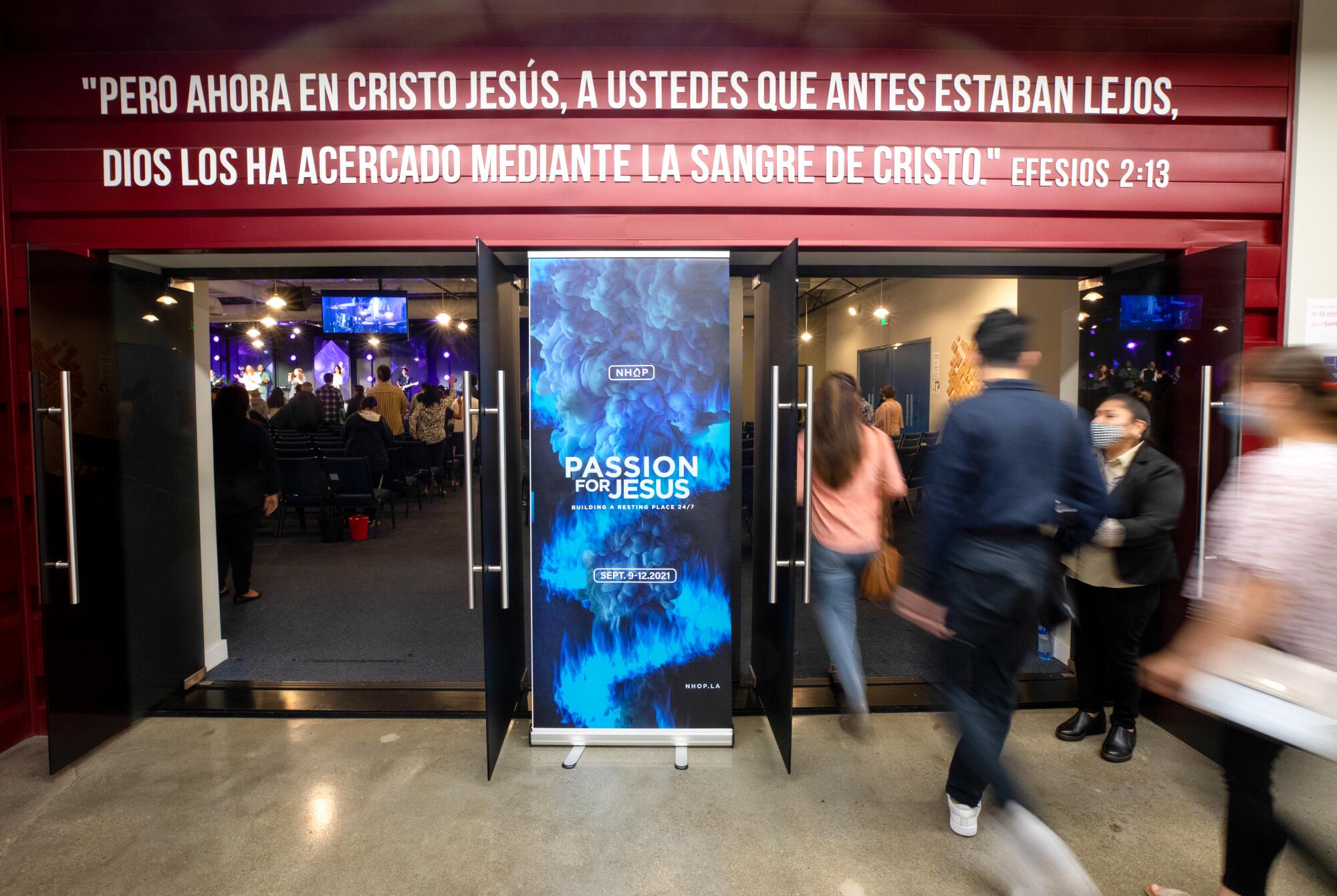
After the 11:30 a.m. church service at Houses of Light one Sunday, Anthony Recio, a 31-year-old youth pastor, explained how he once supported Bernie Sanders but ended up voting for Trump twice.
“I don’t like [Trump’s] character at all,” he said, but “I want someone who can actually surround himself with people who value many of the things that I value.”
Recio, who defines himself as nonpartisan, said that although he is against abortion, his principal reason for supporting Trump was the former president’s entrepreneurialism and management of a strong economy. The Republican ideology of free markets and bootstraps individualism resonates with many evangelicals, said Jonathan Calvillo, an assistant professor at Boston University School of Theology and author of “The Saints of Santa Ana,” about how Latino identity is shaped by faith.
“It’s a very entrepreneurial sort of spiritualism,” Calvillo said. “For instance, many start their own church and then a second church. It’s very oriented toward being, in a sense, business-savvy.”
Latino evangelicals are bringing that idea of can-do spirituality to bear not only at the national and state level but on local councils and school boards. In 2020, the National Hispanic Christian Leadership Conference launched a campaign dubbed “El Voto Hispano” to mobilize Latino evangelical voters.
This year, the campaign was revamped to prioritize local government offices and school boards, Rodriguez said. He was inspired by last year’s Virginia governor’s race, in which Republican candidate Glenn Younkin drilled down on local issues such as parental control over COVID-related health measures in schools and the teaching of controversial subjects like racism.
“Our faith and education coalition now includes a parental-engagement school board component that we didn’t have before,” Rodriguez said. “Engage Latino evangelical parents to attend school board meetings, to run for local school board.”
It’s all part of what Gómez tells his flock is using “politics as a means to an end, and not the end itself.”
“It’s not even about Democrats or Republicans,” Gómez said. “We want in a way to be relevant and speak of what is happening. It’s not like the church is just within these four walls.”
More to Read
Sign up for Essential California
The most important California stories and recommendations in your inbox every morning.
You may occasionally receive promotional content from the Los Angeles Times.












